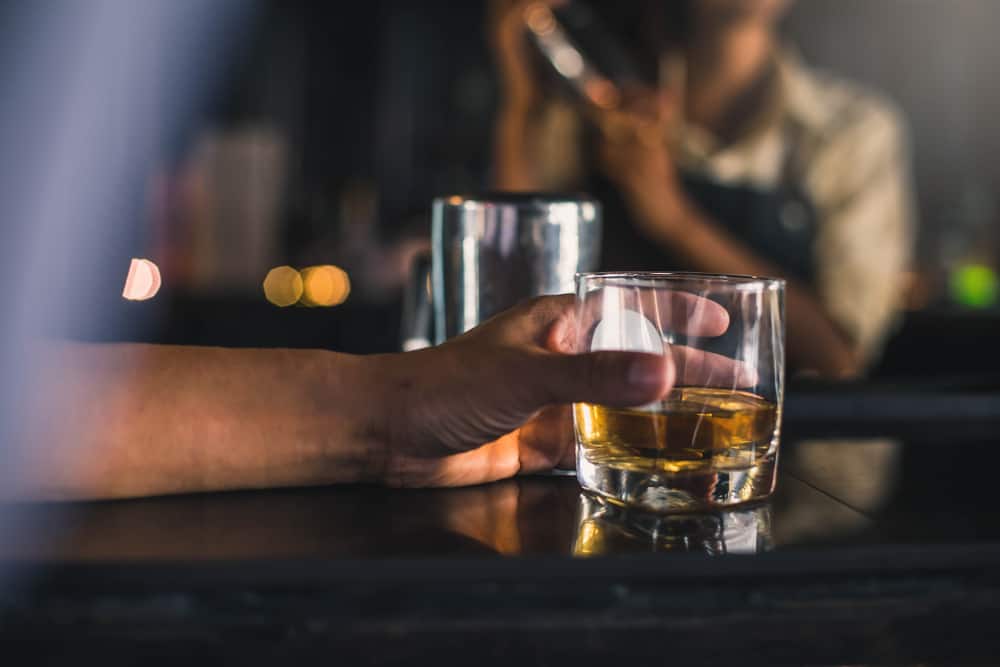Alcohol is a drug. Since it’s legal and used recreationally by a majority of adults, it can be hard to detect when or if drinking is problematic — especially early on. Alcoholism is a progressive disease characterized by uncontrolled drinking due to psychological and physical dependence on alcohol. If you’re concerned about a close friend, romantic partner, family member, or yourself, you might be wondering about early signs of alcoholism that may give you clues as to whether alcohol use is a cause for concern.
Northbound Treatment is a rehabilitation center that offers a range of addiction treatment programs, including rehab for alcoholism. Our programs are comprehensive, effective, and include educational information to help our clients and their families fully understand the disease they’re facing. Knowing the early signs of alcoholism can aid in preventing its progression and getting proper addiction treatment.
Early Signs of an Alcohol Problem
Alcoholism progresses in stages: the beginning stages, problematic drinking, severe alcohol abuse, and the final stages. From problematic drinking on, the signs start to become more clear. However, the beginning stages are much less obvious and often go unnoticed to the untrained eye.
What are the early signs of an alcohol problem? When it comes to alcoholism and alcohol abuse, the initial signs and symptoms are mostly behavioral. A person in the beginning stages might seem like they can’t socialize without drinking alcohol, they may drink to cope, drink compulsively, be unable to control their drinking, develop a high tolerance, and exhibit some reckless behaviors. Here’s what you need to know about the behavioral signs.
Can’t Socialize without Alcohol
One of the telltale early signs of alcoholism is when an individual can’t socialize without alcohol. You might notice that they only want to go to bars, parties, happy hours, or other events where liquor will be served.
Many adult social gatherings do involve alcohol, especially when they’re held in the evening. And yet, it’s not always the case for things like a group hike, a picnic at the park, a kids’ sports game or birthday party, a baby shower, or a movie night. If you notice your loved one is unwilling to interact with people without drinking alcohol or vocally shuns events where liquor won’t be served, it could be a sign of addiction or dependence.
Drinking to Cope
Generally speaking, people who use alcohol recreationally tend to drink in celebration, and in some cases, to “wind down.” This isn’t necessarily a cause for concern, as long as it’s not excessive or destructive.
Having said that, those with an alcohol problem may also drink to cope with negative emotions or circumstances. Whether they’re feeling stressed, sad, angry, let down, anxious, or grieving a loss, alcoholics often drink in response to negativity. Some individuals use alcohol to cope with existing mental health issues, such as trauma, bipolar disorder, anxiety, or depression.
Compulsive Drinking
Compulsive drinking is another early sign that someone has an alcohol problem. This typically involves frequent unplanned alcohol use. For instance, a person may declare that they’re not going to drink at a restaurant that evening and then end up having multiple cocktails. Or they might say they don’t need to bring wine to a ladies’ night get-together and then pick some up at the last minute.
For those with early-stage alcoholism, these failed attempts to abstain from drinking are red flags. Furthermore, repeatedly declaring to go without alcohol at various events is concerning in and of itself. Even if someone isn’t directly expressing that they have a drinking problem, these statements should be taken seriously.
Uncontrolled Drinking
Uncontrolled drinking is related to compulsive drinking, except instead of failing to abstain from alcohol, it’s characterized by a person’s inability to stop drinking once they start. For example, before going to a party, an individual might say they’re only going to have one or two drinks. Once they have their first beer, cocktail, or glass of wine, all bets are off, and they end up drinking excessively.
In addition to consuming more alcohol than intended, uncontrolled drinking also involves behaviors that are concerning to others. In social settings, a person might seem to be constantly refilling their cup with more liquor and worrying whether there will be enough to go around. They may also stumble, slur their words, become aggressive, or black out.
Some people will express remorse for their uncontrolled drinking habits and confide in their loved ones that they’d like to cut down or quit. However, it’s not uncommon to be in denial about a drinking problem at this stage, either.
High Tolerance
High tolerance can be an early sign of alcoholism. An individual with an alcoholic personality might describe it as being able to “hold their liquor.” Some people boast about tolerance and view it as a point of pride, but it should be taken seriously. For one, it can be a symptom of alcohol dependence, in which a person has a constant physical and psychological urge to drink.
Additionally, alcohol tolerance allows someone to drink much more than the average person before they become intoxicated. If their goal is to get a “buzz” or be drunk, they might end up drinking a high volume of liquor or binge drinking to achieve it. Not only is excessive drinking dangerous in the moment, but it can also damage the liver and lead to other health problems.
Recklessness
Reckless behaviors can occur during any of the stages of alcoholism. Though an isolated incident doesn’t necessarily mean an individual has an alcohol problem, continual recklessness is definitely a red flag.
Careless, irresponsible behaviors might include getting into physical altercations, drinking and driving, using other drugs, going to work or school while under the influence, staying out all night, stealing, and participating in other illegal or hazardous activities.
When Alcoholism Progresses
The early signs of alcoholism are usually somewhat hard to notice, but knowing what to look for can help prevent the disease from progressing. When a person doesn’t change their problematic habits, the signs and symptoms will become more evident. Soon enough, an alcohol problem will enter a more serious phase.
Problematic Drinking
When alcohol abuse becomes problematic, an individual’s close friends and family will typically begin to take notice. This is when chemical dependence sets in, and alcoholics start to experience withdrawal symptoms without liquor in their system. At this stage, many people try to hide their drinking habits from others. They might also experience some health problems, perform poorly at work or school, struggle financially, and withdraw from their loved ones.
Severe Alcohol Abuse
During the severe alcohol abuse stage, an alcoholic will become even more dependent on liquor with seemingly out-of-control cravings. These cravings can be all-consuming and lead to irritability, aggression, and depression. At this point, some alcoholics begin to avoid their responsibilities, have relationship problems, become secretive or deceptive, and have a variety of health problems.
The Final Stages: Obsessive Alcoholism
In the final stages of alcoholism, drinking is an obsession. During this time, alcoholics are under the influence more often than not, and they tend to remain inebriated for extended periods. End-stage alcoholism is also characterized by chronic health issues, usually linked to liver damage, along with neglect for hygiene and proper nutrition.
When alcoholism progresses this far, some people can end up with cirrhosis of the liver, hepatitis, cardiovascular problems, respiratory issues, vitamin deficiencies, muscle deterioration, tremors, hallucinations, delusions, or brain damage.
Northbound Treatment’s Approach to Alcohol Rehab
For over 30 years, Northbound Treatment has been successfully helping individuals overcome addiction and substance abuse disorder. Our comprehensive treatment plans for alcoholism involve a continuum of care, often beginning with medically managed detox. Severe alcohol withdrawal can be exceedingly uncomfortable and even unsafe to go through alone. At Northbound’s fully licensed detox and treatment center in Newport Beach, California, clients can detoxify in a secure and comfortable setting with 24-hour-a-day access to medical staff, psychiatric support, alcohol rehab insurance and therapists.
After completing detox, many patients move on to one of our residential rehabilitation programs in Orange County. This is where they discover underlying causes of alcoholism, learn about their triggers, develop coping tools, and work on their physical, mental, and emotional well-being. Many clients receive dual diagnosis treatment, which addresses mental health disorders in conjunction with substance abuse. Northbound Treatment offers both short- and long-term inpatient rehab programs for alcohol addiction.
Following residential rehab for alcohol, clients can begin intensive outpatient treatment (IOP), during which they’ll continue meeting with therapists and participating in evidenced-based therapeutic activities. Northbound also offers non-intensive outpatient (OP) services, which typically come after IOP treatment, as well as telehealth outpatient appointments. Lastly, Northbound provides addiction support services for those who’ve graduated from outpatient treatment, which helps them adjust to independent sober living, maintain good health, and find happiness.
Are you or someone close to you struggling with alcohol abuse? Don’t delay getting the help you need. Call us today to get started.
Sources:
- Buddy, T. “Early Signs to Watch for When Someone Is an Alcoholic.” Verywellmind.com. N.p., n.d., https://www.verywellmind.com/early-signs-of-an-alcoholic-4062471
- Cherney, Kristeen. “Stages of Alcoholism: When Is It A Problem?” Healthline.com. N.p., 24 June 2014., https://www.healthline.com/health/stages-alcoholism










